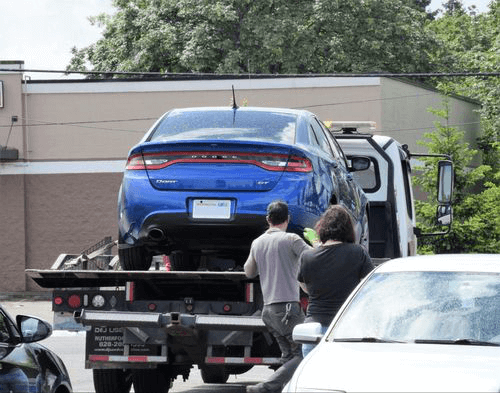Table of Contents
- Can You Avoid Title Loan Repossession?
- Does a Title Loan Repossession Count as a Regular Repossession?
- Steps to Avoid Car Title Loan Repossession
- What Happens if a Title Loan is Not Repaid and You Don’t Avoid a Car Repossession?
- What to Do if You Receive a Notice Mentioning Potential Repossession
- Find the Right Title Loan Provider to Try and Avoid a Car Repossession
- FAQs About Avoiding Car Title Loan Repossession
Can You Avoid Title Loan Repossession?
Title loans can be a convenient way to get emergency cash during a difficult financial situation. Since you are using the title to your car to guarantee the loan, it’s important to meet your payment obligations to avoid a title loan repossession. If you default on the loan, the lender has the legal right to repossess your vehicle and sell it. While that may sound discouraging if you’re a first-time applicant, know that it is possible to steer clear of that scenario by being responsible with your monthly payments.
If your financial situation changes during the repayment process and you are worried about missing a payment, it’s recommended that you speak with your title lender or loan servicer immediately to discuss the steps you can take to avoid vehicle repossession. Continue reading to learn more about vehicle repossessions, how to get out of a title loan, and what you can do to keep your loan in good standing.
Does a Title Loan Repossession Count as a Regular Repossession?
Yes, a title loan repossession is treated the same as a “regular” vehicle repossession. Whether you’re financing a car or taking out a title loan, a lender has the legal right to repossess your vehicle if you fail to cover your monthly payments. A lender may contact you after you miss a payment to discuss the situation and potential solutions to get your loan back on track. In this scenario, if you don’t respond to the attempts to contact you and refuse to resolve your late payments, the lender will ultimately seize the collateral for the loan.
A title loan lender may report the repossession to the major credit bureaus. The repossession can remain on your credit report for up to seven years, which can impact your chances of applying for another loan or other types of credit in the future. While it’s possible to improve your credit score after it has taken a significant hit, the process may take a considerable amount of time. Ensure you prioritize the installment payments each month and create a solid budgeting plan to stay on top of your payment schedule.

Call Our Team
Take the first step and call our toll-free hotline to speak with a specialist.
Steps to Avoid Car Title Loan Repossession
As mentioned previously, you can avoid a car title loan repossession if you’re responsible with your monthly payments. If you want a detailed guide on how you can prevent losing your main source of transportation during the repayment process for a vehicle title loan, take a closer look at this step-by-step process:1
- Understand What You Will Have to Pay: When receiving your title loan contract, you must understand the total cost of your loan and create a realistic budget that can help you cover your installment payments. By knowing exactly what you’ll owe and planning your repayment strategy, you can work to avoid the possibility of falling behind on your payments.
- Make Consistent Payments: Staying on top of your loan payments is the best way to avoid a car repossession. Always make sure that you pay your loan on or before the due date to maintain consistency with your monthly payments. If you have problems remembering your monthly payment date, you can try setting up automatic payments from your checking account if your lender provides this option. Or, you can put reminders on your smartphone or calendar to keep track of your payment plan. The easiest way to get out of a title loan is to complete your payment obligations. You can even try to pay more than the minimum amount due each month to shorten the repayment process.
- Proactively Communicate with Your Lender: Borrowers may encounter unexpected expenses when repaying their auto title loans. If you encounter financial difficulties during the repayment process, contact your lender or loan servicer promptly to explore your options and avoid defaulting on your loan, which can lead to vehicle repossession.
- Refinance Your Title Loan: Depending on the title lender you work with, you may be able to negotiate your loan terms to make the loan more affordable by requesting a lower interest rate, lower monthly payments, or a longer repayment period. However, if your lender won’t budge and you are unsuccessful, you can try to refinance your existing loan with a new title lender that offers flexible loan terms and more manageable payments.1
- Look for Professional Financial Assistance: Consider consulting a financial advisor for additional guidance on prioritizing your payments. A knowledgeable and experienced advisor can help you create an effective budgeting plan and develop some useful strategies to prevent a car title loan repossession.
What Happens if a Title Loan is Not Repaid and You Don’t Avoid a Car Repossession?
The potential consequences of a title loan default may go beyond a vehicle repossession. Although a title loan repossession can result in the loss of your primary source of transportation, the impact can be more severe than you might think. Take a look at some of the consequences borrowers can face when they don’t complete their payment obligations for a car title loan:
- Credit Score Damage if the Repossession and Payment Behavior are Reported
- Paying Your Loan’s Deficiency Balance if the Sale of the Collateral Didn’t Cover the Full Amount Owed
- Covering Fees Associated with the Repossession (e.g., Cost of Storing Your Vehicle and Repo Fees)
- Paying Higher Car Insurance Rates on a Replacement Vehicle Due to the Negative Impact on Your Credit History
- Difficulty Receiving Approval for Future Loans or Credit Cards
Keep in mind that if you fail to pay the deficiency balance of your loan, a lender may turn the debt over to collections. Don’t forget to speak with your title loan lender or loan servicer if you’re struggling with your payments to avoid the problems that come with a vehicle repossession.
What to Do if You Receive a Notice Mentioning Potential Repossession
If you live in a state where you are required to receive a notice before your vehicle is assigned to a repossession agency, you may have a second chance to bring your title loan account current. As soon as you’re aware of an intended repossession, you must act quickly to protect your vehicle and avoid the negative impact a vehicle repossession can have on your life, credit and finances.
Here’s a list of what you can do to manage the situation when getting a notice mentioning potential repossession:
- Review the Notice and Speak With Your Lender to Understand How Much You Owe
- Decide Whether You Can Realistically Afford to Pay the Title Loan or Let the Lender Repossess and Sell Your Car
- Ask Friends or Family for Financial Help or Get a Second Job to Catch Up on Your Payments

Find the Right Title Loan Provider to Try and Avoid a Car Repossession
Finding the right title loan company or provider is one of the steps you can take to prevent a car repossession. Make sure to shop around and find a loan option that has the most optimal loan terms available to you. If you apply with a provider that offers an inconvenient payment schedule, for example, it can be harder to manage your loan payments. A reliable title loan lender should offer transparency throughout the application process so that the borrower fully understands what the repayment process will look like.
Fortunately, you can expect convenience and transparency when applying for a car title loan serviced by LoanMart. You don’t have to worry about hidden fees or prepayment penalties that will complicate the repayment process, and you can access different perks, like flexible loan terms and competitive interest rates.1 5 If you choose to apply for a vehicle-secured loan to get fast cash, you can also expect an application process that is fast and simple. An applicant who qualifies for an auto title loan serviced by LoanMart can get a direct deposit to their bank account in as little as 24 hours!3
If you’re interested in applying for an online title loan serviced by LoanMart, you can get the financial relief you’re searching for by completing the following three simple steps:
- Submit a Short Prequalification Form Online or Call a Representative at 855-422-7412 to Apply Over the Phone
- Provide Some Necessary Documents to Verify Your Information
- Receive Your Fast Title Loan Money if You’re Eligible!1
FAQs About Avoiding Car Title Loan Repossession
Before you apply for an auto title loan, it’s essential that you weigh the impact of a vehicle repossession and decide whether this secured loan is the right path forward for your situation. Review some of the most frequently asked questions about avoiding auto title loan repossession:
How to Stop a Title Loan Repossession
If you live in a state where a title lender is required to provide notice prior to repossession, you will have a limited amount of time to catch up on your payments and prevent a title loan repossession.
How Do Lenders Avoid Title Loan Repossessions?
Some title lenders are willing to work with borrowers facing financial difficulties in order to avoid title loan repossessions. In some cases, the title lender may help the individual get back on track with their loan payments, such as offering extended payment plans or loan modifications.
When Can a Title Loan Company Take Your Car?
A title loan company may be able to repossess your car as soon as you miss a payment or fail to pay your loan according to the terms of your agreement. Some states allow lenders to repossess vehicles without issuing written notices before repossession, so if you’re struggling with your title loan payments, contact the appropriate party immediately to seek support.
Is a Charge-Off Better Than a Repossession?
Both scenarios can impact your credit significantly, and one does not always precede the other. For example, the lender may decide to charge off the loan before the repossession occurs. With a vehicle repossession, you are still responsible for paying off the remaining balance if the sale of your vehicle does not cover the total amount that you owe in storage and late fees, along with the total loan balance. A charge-off is an accounting decision that occurs when the lender determines that the borrower is unlikely to pay their debt, but it does not absolve you from covering the amount you owe.

